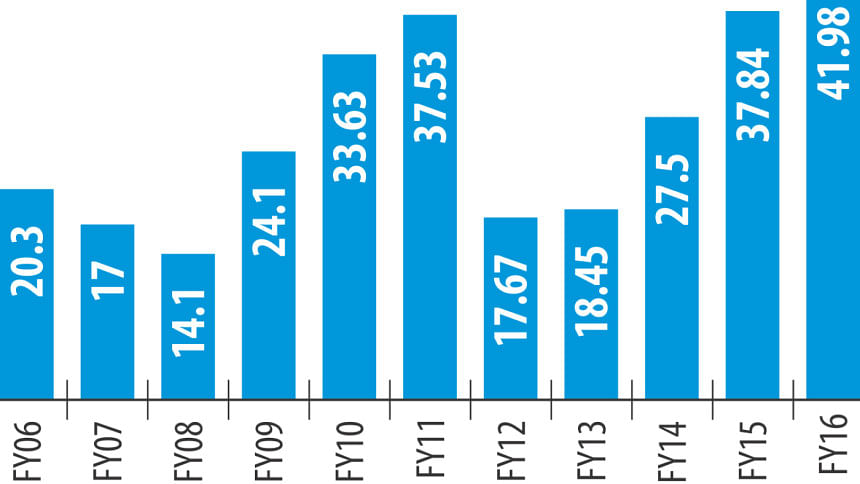Wheat imports hit a record high

Wheat imports crossed the 40 lakh-tonne mark for the first time in the outgoing fiscal year, buoyed by low international prices and increased demand from food manufacturers, said operators.
Wheat arrivals rose 11 percent year-on-year to 42 lakh tonnes in fiscal 2015-16 -- the highest in the last three decades -- with the private sector accounting for 88 percent of the imports, according to data from the food ministry.
“This is because wheat consumption is going up,” said Tariq Ahmed, director of operation and marketing of TK Group, a large commodity importer and processor based in Chittagong.
The expansion of bakery and confectionary industries has raised the demand for wheat. “The food sector is growing by 15-20 percent a year, so consumption will go up further,” he added.
“Expansion of fast food restaurants and a growing export-oriented food processing sector suggest that Bangladesh is an emerging market for higher protein wheat,” said the US Department of Agriculture in a report on wheat milling in Bangladesh.
For the last four years, local farmers have been growing the cereal on more lands, raising total production to 13 lakh tonnes on an average.
But local production could meet only one-fourth of the annual demand of nearly 50 lakh tonnes, according to industry analysts.
The domestic demand for wheat has been growing by 2-3 lakh tonnes a year, said Md Badrul Hasan, additional director general of the Directorate General of Food.
The daily per capita wheat consumption grew 116 percent to 26 grams in 2010 from 12 grams in 2005, according to Bangladesh Bureau of Statistics' Household Income and Expenditure Survey 2010.
Consumption of the grain has soared both in urban and rural areas during the period, with the rural areas recording 192 percent surge, it said.

Hasan said the private sector has been taking advantage of the low prices in the global market and importing large quantities of wheat.
“The higher arrival of wheat has created a downward pressure on the prices of wheat and rice,” he added.
For instance, yesterday, wheat flour -- both packaged and unpackaged -- traded 9 percent lower at Tk 25-Tk 34 each kilogram at the retail level in Dhaka from a year ago, according to Trading Corporation of Bangladesh.
The current lowest price of wheat flour is Tk 5 less than the lowest price of rice at Tk 30 per kilogram, according to TCB. Industry operators said the lower prices of wheat than rice also encouraged increased consumption of the grain, which is the second-most important food staple, accounting for about 12 percent of the total cereal consumption, according to a USDA estimate.
Given the strong pace of import, the USDA, in April this year, raised its projection on Bangladesh's wheat import to 40 lakh tonnes for the outgoing fiscal year.
“Private sector import demand is expected to remain strong for 2016-17,” the USDA said in its Grain and Feed Annual report, which was released in April.
The report, however, said it is unclear whether the government demand would rise as it is currently providing cash in lieu of distributing wheat via the public food distribution system.
The report forecasted Bangladesh's wheat imports would be 42 lakh tonnes in fiscal 2016-17 due to a rising population and expectations of low international prices.
The DG Food imported 4.16 lakh tonnes of wheat in the outgoing fiscal year, up 25 percent year-on-year, according to food ministry.

 For all latest news, follow The Daily Star's Google News channel.
For all latest news, follow The Daily Star's Google News channel. 



Comments